
Browse an alphabetical list of photographs. These historical images portray people, places, and events before, during, and after World War II and the Holocaust.
<< Previous | Displaying results 1841-1850 of 2641 for "Photo" | Next >>
Portrait of two Romani (Gypsy) women. Both were deported to Auschwitz in 1941. Photograph taken in Czechoslovakia, 1937.
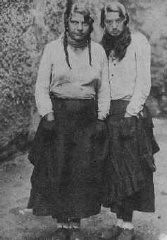
Portrait of two schoolchildren: Solomon Faradji, son of Avram Faradji, and Sami Levi, son of Rafael Levi. Solomon lived at Karagoryeva 113, and Sami lived at Karagoryeva 105, in Bitola. This photograph was one of the individual and family portraits of members of the Jewish community of Bitola, Macedonia, used by Bulgarian occupation authorities to register the Jewish population prior to its deportation in March 1943.
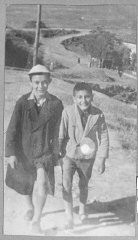
Portrait of Victoria and Isak Assael, the daughter and son of Shabetai Assael. They were students and lived at Sremska 9 in Bitola. This photograph was one of the individual and family portraits of members of the Jewish community of Bitola, Macedonia, used by Bulgarian occupation authorities to register the Jewish population prior to its deportation in March 1943.
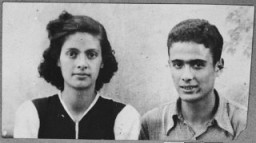
Portrait of Vida Kalderon, wife of Yakov Kalderon. She lived at Orisarska 2 in Bitola. This photograph was one of the individual and family portraits of members of the Jewish community of Bitola, Macedonia, used by Bulgarian occupation authorities to register the Jewish population prior to its deportation in March 1943.
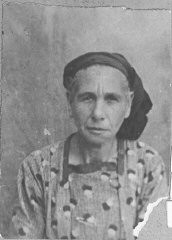
Walter Marx (standing at left) with father Ludwig, mother Johanna, and cousin Werner. In 1944, Walter joined partisans in Italy. He was the only one in the photograph to survive the Holocaust.
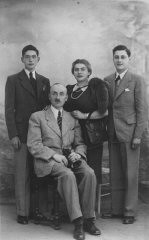
Portrait of writer Sigrid Undset, who won the Nobel Prize for Literature in 1928. Often with feminist themes, her novels were banned and burned in part because of her public criticism of the Nazi regime. Photo taken by Anders Beer Wilse on July 1, 1923.
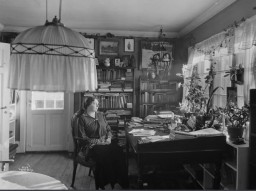
Portrait of Yakov Testa with wife and three children in Bitola. This photograph was one of the individual and family portraits of members of the Jewish community of Bitola, Macedonia, used by Bulgarian occupation authorities to register the Jewish population prior to its deportation in March 1943.
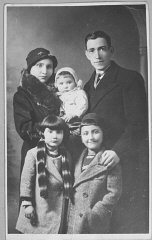
Portrait of Yosef Eschkenasi and his wife, Sara. Yosef was a laborer. They lived at Zmayeva 10 in Bitola. This photograph was one of the individual and family portraits of members of the Jewish community of Bitola, Macedonia, used by Bulgarian occupation authorities to register the Jewish population prior to its deportation in March 1943.
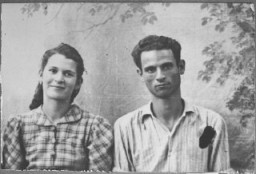
Portrait of Władysław Bartoszewski, Poland, unknown date. Władysław Bartoszewski (1922–2015) was a co-founder and member of the Council for Aid to Jews, codenamed “Żegota.” Żegota was a clandestine rescue organization of Poles and Jews in German-occupied Poland. Supported by the Polish government-in-exile, Żegota coordinated efforts to save Jews from Nazi persecution and murder. It operated from 1942 to 1945. After World War II broke out in September 1939, Władysław worked as a janitor…
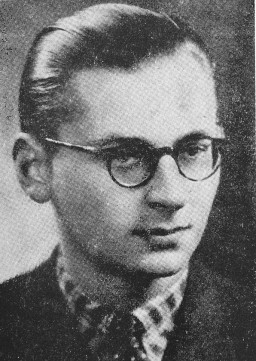
Wartime portrait of Andrzej Klimowicz, Poland. Andrzej Klimowicz (1918–1996) aided and rescued Jews in Warsaw throughout the duration of the German occupation of Poland. He eventually became a member of the Council for Aid to Jews (codenamed “Żegota”), a clandestine organization that coordinated efforts to save Jews from Nazi persecution and murder. Under the auspices of Żegota, Andrzej played a role in providing Jews in Warsaw with forged identity papers and hiding places outside the walls of the…
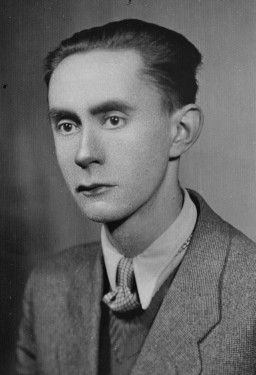
We would like to thank Crown Family Philanthropies, Abe and Ida Cooper Foundation, the Claims Conference, EVZ, and BMF for supporting the ongoing work to create content and resources for the Holocaust Encyclopedia. View the list of donor acknowledgement.